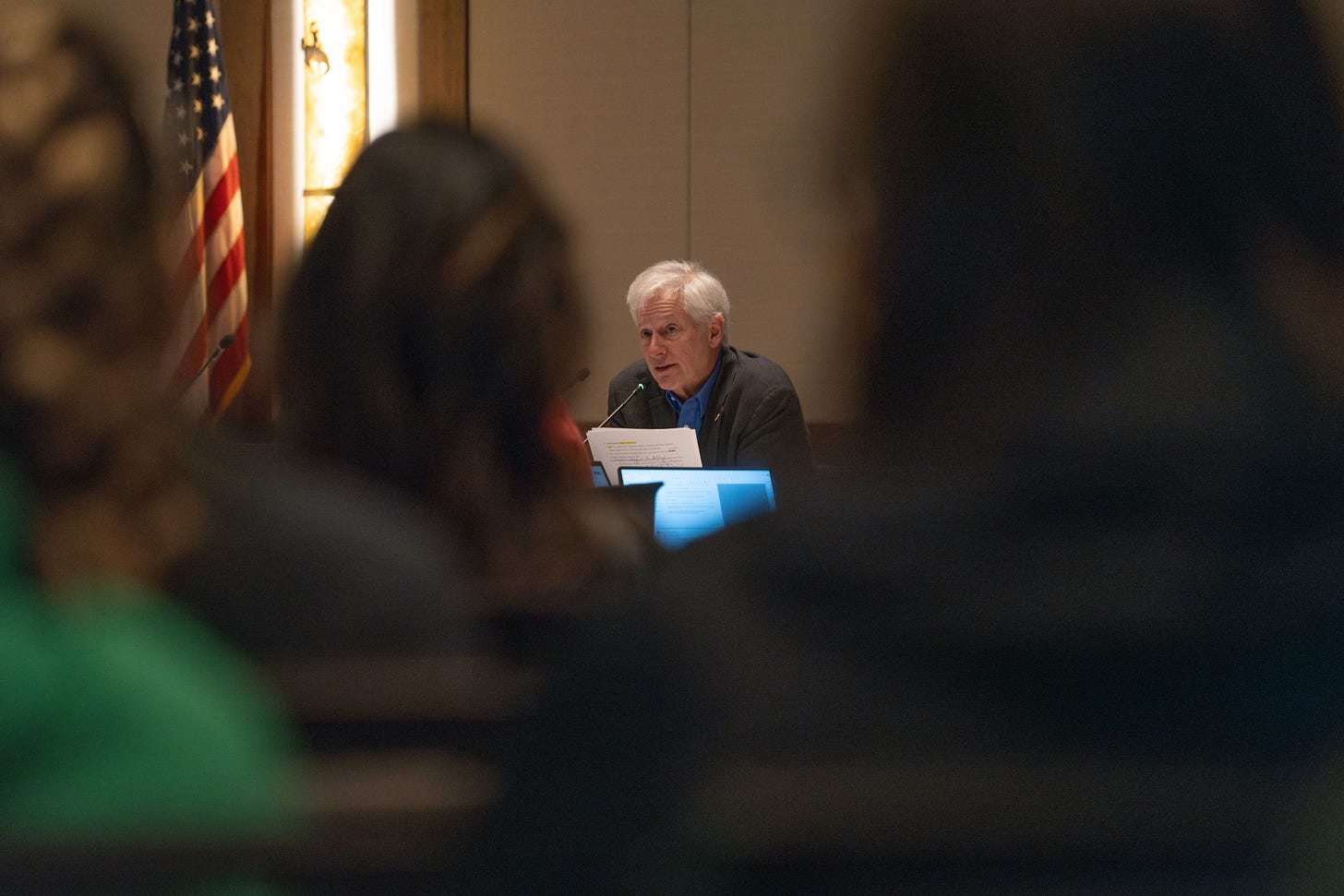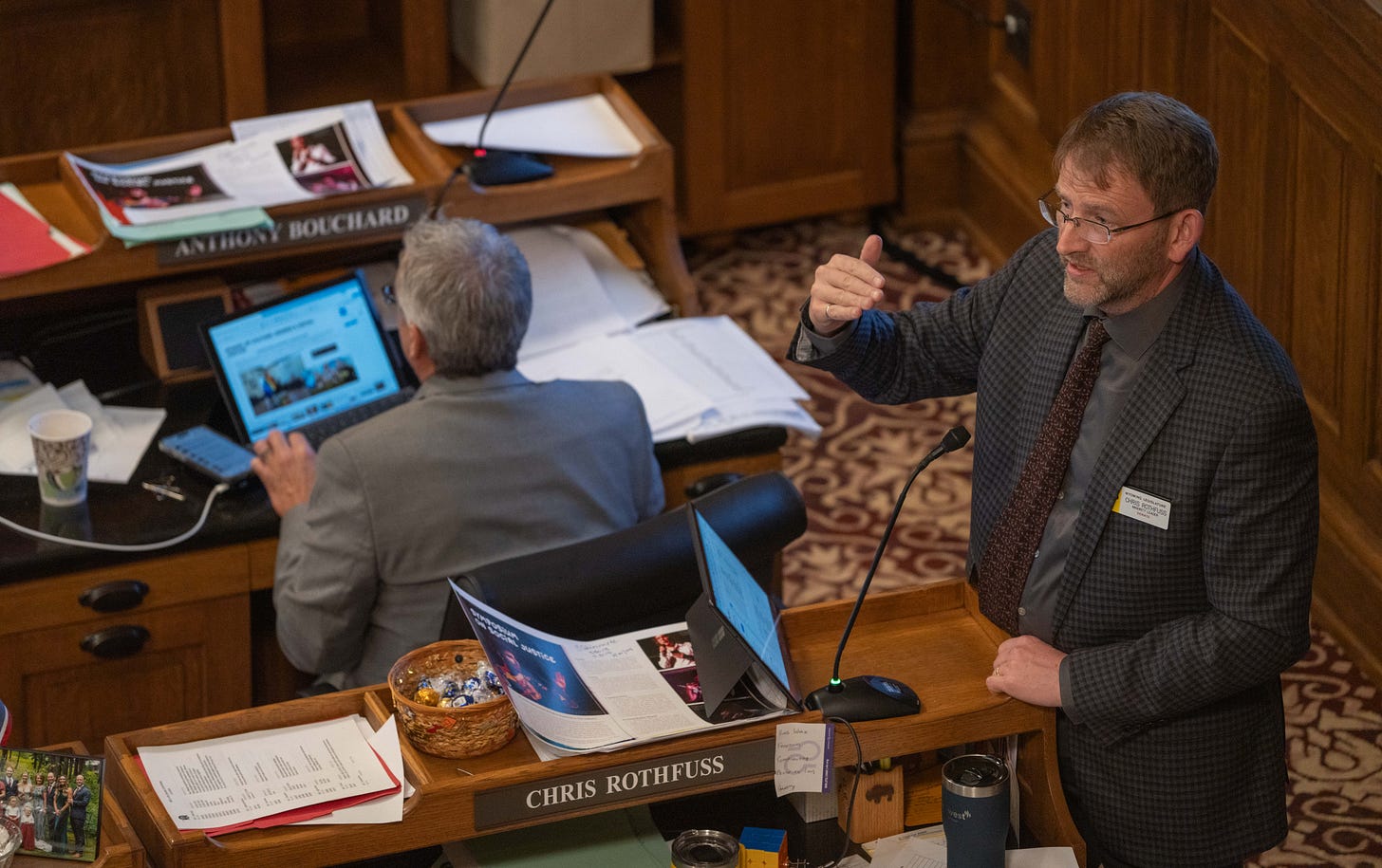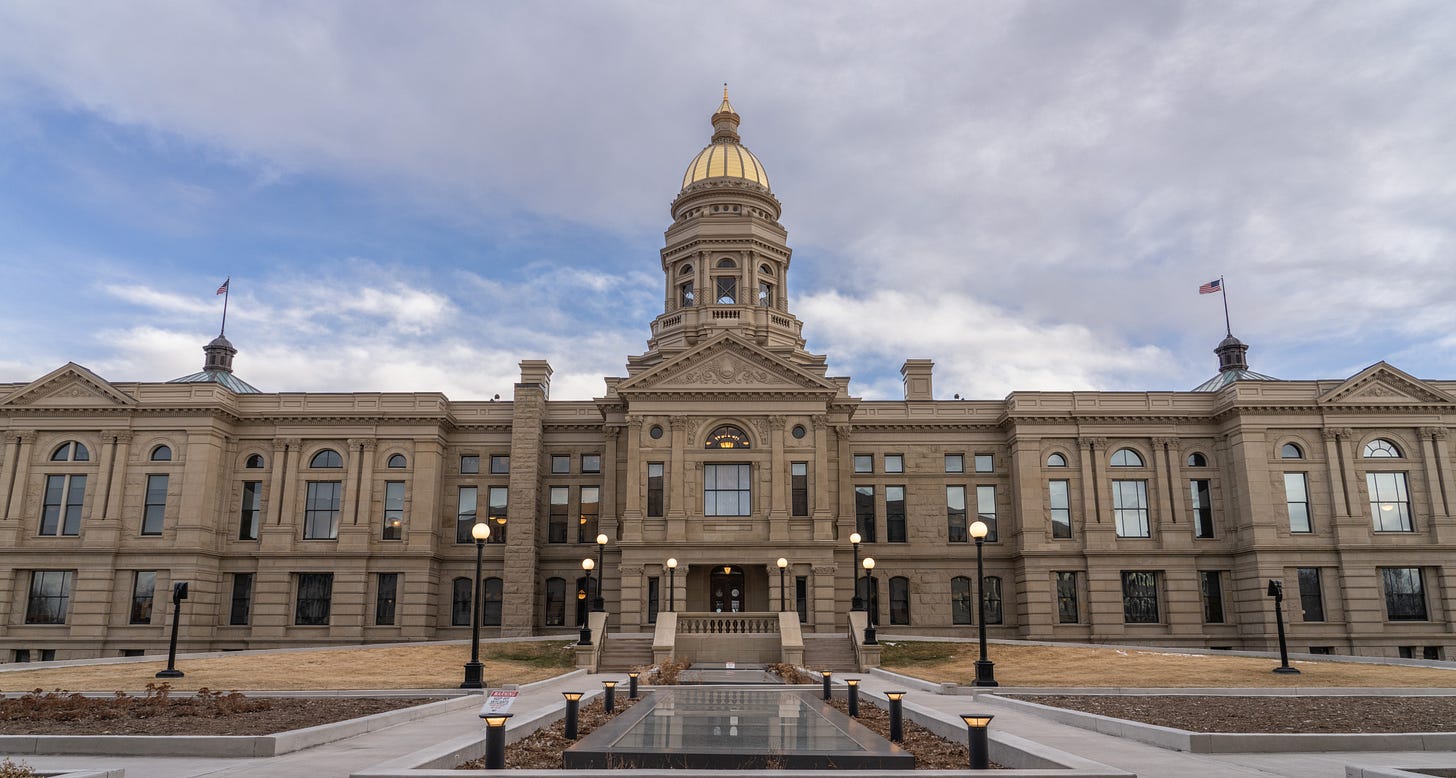Lawmakers amend and advance DEI bill, while another looms
Education officials warned House Bill 147 would have a “chilling effect” in schools and colleges. Others said classroom subjects, even the history of slavery, should be taught without taking sides.
The state’s right-wing Freedom Caucus is angling to crack down on what it claims are “discriminatory” educational requirements at the University of Wyoming.
House Bill 147 would prohibit schools, colleges and the University of Wyoming from “engaging in” diversity, equity and inclusion activities and from offering courses that “promote” the concept of institutional discrimination.
Meanwhile, Senate File 103 would forbid UW from requiring any course that discusses the connection between “contemporary American society” and a laundry list of social science concepts — including “critical theory” and “whiteness” but also “unconscious bias,” “microaggressions” and “systemic racism.” UW would still be able to host courses that discuss these topics, but they must in no way be required for graduation.
The first of these bills, House Bill 147, was introduced and heard by the House Education Committee Wednesday.
That committee ultimately advanced the bill with a unanimous 9-0 vote. The vote reflects a recent decision by legislative leaders to cut those who are not ideologically aligned with the Freedom Caucus from the education committee specifically.
“Institutional discrimination” bill advances out of committee
Education officials, a UW student and an LGBTQ+ advocate voiced concern that House Bill 147 could or would have a “chilling effect” on classrooms by failing to clearly state what it was prohibiting and leaving teachers afraid to discuss certain topics.
Meanwhile, representatives of groups such as the Family Policy Alliance and Moms for Liberty spoke in glowing terms about the bill, calling DEI “racist” and decrying a modern educational environment they said had gone off the rails.
Patricia McCoy is chair of the Laramie County chapter of Moms for Liberty. She said teachers should offer instruction in a neutral way — even if the topic is about historical atrocities.
“You can teach the history of slavery without saying it was the result of white supremacy,” McCoy said. “It was not just the result of white supremacy, and I can spend hours speaking about it, but you can do it without making people the aggressor or the oppressor in certain situations, and have those conversations without pushing certain ideologies.”
The bill forbids government agencies — including the University of Wyoming, community colleges and public schools — from “engaging in” any program, or requiring any training, or promoting any policy that meets the bill’s own definition of DEI.

The given definition is at odds with the most commonly accepted definitions for “diversity, equity and inclusion” — which usually stress taking action to ensure equal access and opportunity while recognizing historical or contemporary barriers to that equality.
The definition found in HB147 instead matches how conservatives typically describe DEI programs and goals. Indeed, it hews closely to how McCoy herself described DEI instruction during her public testimony. She alleged students are “already being told, ‘Some of you are victims,’ and, ‘Some of you are oppressors’ just because of the color of your skin.”
The bill states that a program, activity or policy qualifies as DEI if it “promotes differential or preferential treatment of individuals or classifies individuals on the basis of race, color, religion, sex, ethnicity or national origin.”
HB147 also forbids UW and other schools from teaching about “institutional discrimination.”
The bill’s sponsor, Freedom Caucus Chair and Cody Rep. Rachel Rodriguez-Williams (HD-50), walked her fellow lawmakers through the proposed legislation during the House Education Committee hearing Wednesday.
“This bill restores our state government to the colorblind approach that the constitution intends, that morality dictates, and that our national unity requires,” she said.
Education officials, representing the Wyoming School Boards Association and the Wyoming Education Association, highlighted a few specific issues with the language of the bill. Namely:
As originally written — with an apparently misplaced “not” — the bill forbade instructors from teaching that people shouldn’t be discriminated against;
As originally written, it possibly forbade instructors from “engaging in” any discussion about institutional discrimination; and
As originally written, it wasn’t clear whether students would still be allowed to voice opinions about such topics during classroom discussion.
“The bill would benefit from clarity that says, ‘Nothing within this section would prohibit students from engaging in discussion on these topics,’” said Brian Farmer, executive director of the school boards association.
Lawmakers introduced and approved amendments to add that specific language and to address the other issues bulleted above — removing the word “not” from the relevant location, and delineating more clearly the instruction the bill forbids teachers from “engaging in” and the concepts it forbids teachers from “promoting.”
Led by its chair, Albany County Rep. Ocean Andrew (HD-46), the committee voted 9-0 to advance the bill, sending it back to the House floor with a recommendation that the chamber pass it. The bill will have to be passed by the Senate before it can be sent to the governor’s desk for his signature.
The view from UW
Last year, lawmakers included a footnote on the university’s budget, forbidding the institution from using state funds on its Office of DEI.
While the footnote did not require UW to outright close the office, that’s exactly what the university did. It also launched an institution-wide review to root out requirements, offerings and programs that lawmakers might label “DEI.” UW President Ed Seidel said at the time the review would evaluate the university’s DEI-adjacent functions to “ensure that they promote merit and do not promote preferential treatment.”
In addition to dismantling its Office of Diversity, Equity and Inclusion, UW announced the cancellation of some diversity-oriented activities and reworked its Multicultural Affairs office.

If these moves were meant to appease the Freedom Caucus and ward off further legislative mandates, they do not appear to be working.
“[T]he university chose to reorganize and rename programs without addressing the legislative intent, which was to defund DEI entirely,” writes Sen. Cheri Steinmetz (SD-3) in a guest column published by Cowboy State Daily. “It became clear that broader, more decisive action was needed. That is why I am now sponsoring a comprehensive bill to terminate and defund DEI programs across all public institutions in Wyoming.”
Steinmetz has been confused in the past about what UW requires of its students and what is currently being taught in classrooms. UW’s recent campaign to root out any program that “promotes preferential treatment” means there might be less for the new bills to actually eliminate.
Yet the legislation is not an empty threat. Their broad definitions could impact a wider range of university offerings.
In addition to the DEI bills, the Freedom Caucus is taking aim at other social issues likely to impact life in Laramie and on campus. The caucus or its members also seek to scale back transgender rights, block public health funding for an annual AIDS fundraiser, and force UW to allow guns in campus buildings.
Another DEI bill waits in the wings
Steinmetz filed her own response to the continuing support she alleges UW has for DEI in the form of Senate File 103.
The bill gets detailed about what can be included in courses required for graduation at the University of Wyoming. It also forbids UW from spending any money on DEI — whether or not that money comes from the state.
SF103 takes aim at what it defines as DEI, which it describes in terms similar to those found in House Bill 147. It prohibits requiring classes that promote “differential treatment of or providing special benefits to persons on the basis of race, color or ethnicity.” Like the house bill, SF103 also advocates colorblindness, prohibiting any “policies or procedures” made “in reference to race, color or ethnicity” (except those explicitly required by federal law).
The result for the institution is that its spending, even the spending of non-state monies, would be restricted. The option UW had last year, to keep funding its Office of DEI with private donations or federal grants, would be off the table.
And the result for campus is that a student would be able to enroll at UW, advance through a multi-year program and receive a degree without encountering instruction about these ideas if they so choose, and that university policy “does not require or constrain students to expend tuition or other funds on, or enroll in, a related course in order to satisfy the requirements of any academic degree program.”
Teaching on these subjects can still be required for specific degree programs, to be exempted by the board of trustees, such as those that focus on “racial, ethnic or gender studies.” However, the courses that make up these degree programs would no longer be able to satisfy general education requirements.

As Laramie Sen. Chris Rothfuss (SD-9) reminded his colleagues during last year’s session — to no avail — UW does not currently require taking such courses for graduation, though elective gender studies courses may satisfy some general requirements.
Steinmetz has led previous efforts to eliminate DEI programs at UW. She was the author of the 2024 budget amendment that axed funding for UW’s DEI Office.
She has also twice attempted a budget amendment to eliminate gender studies courses at UW, though neither of these attempts made it into the final budget bill signed by the governor.
The bill has nine co-sponsors, none of them from Albany County.





I doubt ms McCoy could discuss any subject for hours, especially DEI, without repeating herself all together.
Intentional misrepresenting and twisting facts is not a position of strength to argue something other than being plain and simple in the education of our children.
History is based on facts in evidence, changeable when new factual information arises, not when someone wants a new agenda to please their particular belief system.
Nowhere in the U.S are teachers singling out white children and firmly placing the blame on them for chattel slavery, that would be absurd. These classes provide valuable historical knowledge on how race drove discrimination and oppression. To say our Constitution or other founding documents intend on treating citizens equally has been laughable when analyzing our history. But that’s the point.
For some reason, removing confederate monuments is erasing history but trying to reduce or eliminate discussions of racism or white supremacy, which absolutely drove American chattel slavery and all of the segregation policies, is totally acceptable.
Banning huge historical truths to cover for hurt feelings is fascism, as is banning books. We all knew the Freedom Caucus would go this route, but it’s horrifying to watch in real time.
To be clear, DEI is not preferential hiring of candidates with no merit to hold that position, nor is it blaming some 9 year old child in a classroom for the sordid history of the U.S. DEI helps spur critical conversations around racism, bias and discrimination past and present. These critical looks into our society and life around us are the one of the high points of education, providing the ability to critically examine the world and properly conduct research to better understandstand it.